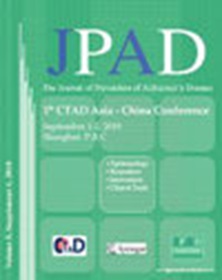Financial Management Skills in Aging, MCI and Dementia: Cross Sectional Relationship to 18F-Florbetapir PET Cortical β-amyloid Deposition
IF 7.8
3区 医学
Q1 CLINICAL NEUROLOGY
引用次数: 11
Abstract
BackgroundThere is a need to more fully characterize financial capacity losses in the preclinical and prodromal stages of Alzheimer’s disease (AD) and their pathological substrates.ObjectivesTo test the association between financial skills and cortical β-amyloid deposition in aging and subjects at risk for AD.DesignCross-sectional analyses of data from the Alzheimer’s Disease Neuroimaging Initiative (ADNI-3) study conducted across 50 plus sites in the US and Canada.SettingMulticenter biomarker study.Participants243 subjects (144 cognitively normal, 79 mild cognitive impairment [MCI], 20 mild AD).Measurements18F-Florbetapir brain PET scans to measure global cortical β-amyloid deposition (SUVr) and the Financial Capacity Instrument Short Form (FCI-SF) to evaluate an individual’s financial skills in monetary calculation, financial concepts, checkbook/register usage, and bank statement usage. There are five sub scores and a total score (range of 0–74) with higher scores indicating better financial skill.ResultsFCI-SF total score was significantly worse in MCI [Cohen’s d= 0.9 (95%CI: 0.6–1.2)] and AD subjects [Cohen’s d=3.1(CI: 2.5–3.7)] compared to normals. Domain scores and completion times also showed significant difference. Across all subjects, higher cortical β-amyloid SUVr was significantly associated with worse FCI-SF total score after co-varying for age, education, and cognitive score [Cohen’s f2=0.751(CI: 0.5–1.1)]. In cognitively normal subjects, after covarying for age, gender, and education, higher β -amyloid PET SUVr was associated with longer task completion time [Cohen’s f2=0.198(CI: 0.06–0.37)].ConclusionUsing a multicenter study sample, we document that financial capacity is impaired in the prodromal and mild stages of AD and that such impairments are, in part, associated with the extent of cortical β-amyloid deposition. In normal aging, β-amyloid deposition is associated with slowing of financial tasks. These data confirm and extend prior research highlighting the utility of financial capacity assessments in at risk samples.老年、轻度认知障碍和痴呆的财务管理技能:与18F-Florbetapir PET皮质β-淀粉样蛋白沉积的横断面关系
有必要更全面地描述阿尔茨海默病(AD)临床前和前驱阶段的经济能力丧失及其病理基础。目的探讨财务技能与老年和AD高危人群皮层β-淀粉样蛋白沉积的关系。设计对来自阿尔茨海默病神经影像学倡议(ADNI-3)研究的数据进行横断面分析,该研究在美国和加拿大的50多个地点进行。多中心生物标志物研究。243名受试者(144名认知正常,79名轻度认知障碍,20名轻度AD)。测量:18f - florbetapir脑部PET扫描,测量皮质β-淀粉样蛋白沉积(SUVr)和金融能力工具短表(FCI-SF),以评估个人在货币计算、金融概念、支票簿/登记册使用和银行对账单使用方面的金融技能。有5个子分数和总分(范围在0-74之间),分数越高说明财务技能越好。结果MCI组[Cohen’s d= 0.9 (95%CI: 0.6 ~ 1.2)]和AD组[Cohen’s d=3.1(95%CI: 2.5 ~ 3.7)]的fci - sf总分明显低于正常组。领域得分和完成时间也有显著差异。在所有受试者中,在年龄、教育程度和认知评分共变后,较高的皮质β-淀粉样蛋白SUVr与较差的FCI-SF总分显著相关[Cohen 's f2=0.751(CI: 0.5-1.1)]。在认知正常的受试者中,在年龄、性别和受教育程度共变后,较高的β -淀粉样蛋白PET SUVr与较长的任务完成时间相关[Cohen 's f2=0.198(CI: 0.06-0.37)]。通过一项多中心研究样本,我们发现在阿尔茨海默病的前症和轻度阶段,经济能力受到损害,这种损害在一定程度上与皮层β-淀粉样蛋白沉积的程度有关。在正常的衰老过程中,β-淀粉样蛋白沉积与财务任务的减缓有关。这些数据证实并扩展了先前的研究,强调了在风险样本中财务能力评估的效用。
本文章由计算机程序翻译,如有差异,请以英文原文为准。
求助全文
约1分钟内获得全文
求助全文
来源期刊

Jpad-Journal of Prevention of Alzheimers Disease
CLINICAL NEUROLOGY-
自引率
7.80%
发文量
85
期刊介绍:
The JPAD « Journal of Prevention of Alzheimer’Disease » will publish reviews, original research articles and short reports to improve our knowledge in the field of Alzheimer prevention including : neurosciences, biomarkers, imaging, epidemiology, public health, physical cognitive exercise, nutrition, risk and protective factors, drug development, trials design, and heath economic outcomes.
JPAD will publish also the meeting abstracts from Clinical Trial on Alzheimer Disease (CTAD) and will be distributed both in paper and online version worldwide.
 求助内容:
求助内容: 应助结果提醒方式:
应助结果提醒方式:


